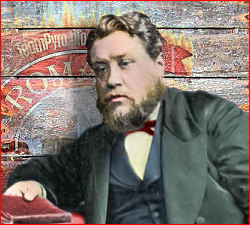 eople love to blame the world or the devil when they do wrong, but there is never a time when other people—or even Satan himself—can lure us into sin unless our own fleshly depravity yields and cooperates with the world and the devil.
eople love to blame the world or the devil when they do wrong, but there is never a time when other people—or even Satan himself—can lure us into sin unless our own fleshly depravity yields and cooperates with the world and the devil. "There hath no temptation taken you but such as is common to man: but God is faithful, who will not suffer you to be tempted above that ye are able; but will with the temptation also make a way to escape, that ye may be able to bear it" (1 Corinthians 10:13).
"There hath no temptation taken you but such as is common to man: but God is faithful, who will not suffer you to be tempted above that ye are able; but will with the temptation also make a way to escape, that ye may be able to bear it" (1 Corinthians 10:13).When Satan is successful in tempting us, it is invariably because we yield. We cannot escape the blame for our sin by claiming it was Satan or the world—rather than our own fleshliness—that drove us to sin. The world, the flesh and the devil all work together to tempt us, but when we sin, it is by definition our own fault.
During one of my trips to India a few years ago I met a college student who approached me after a meeting where I taught. He said he believed he was suffering under an intense Satanic attack, and he wondered if I knew of any special methods of spiritual warfare that could help rid his home and family of Satanic influences.
So I asked about the nature of the attack he was under. He said he was finding it impossible to get along with his mother. He said the two of them hardly ever spoke a civil word to one another, and it was destroying the peace of their household. He said he found it hard to study the Bible or grow spiritually as long as evil tension ruled the home environment. He was hoping I would tell him how he could get Satan out of his household.
I first asked him what made him think this problem was uniquely Satanic. As he described it to me, it sounded much more like raw carnal pride on both his part and his mother's. They were constantly saying unkind and unloving things to one another. He admitted that he purposely did things he knew would annoy her. He spoke disrespectfully to her. He stated quite clearly that he couldn't stand her and didn't like being around her. It sounded like an unbridled case of youthful rebellion on his part, rather than a satanic attack.
So I told him that. I said, "It sounds to me like you're just behaving in a fleshly way. I think you need to look into your own heart for the culprit, rather than blaming the devil and outside influences."
But he insisted that I just didn't understand the issue. It must be Satanic, he said, because the nature of his conflict with his mother was so powerful. And besides, he said, living with her was like living with the devil. And when I raised my eyebrow at that, he quickly added that he couldn't help himself; the temptation to speak hatefully to her and about her was so overpowering, it was as if evil forces had taken over his mind.
I told him first of all, that regardless of Satan's involvement in his home, the root sin causing his problems was fleshly, carnal pride. I also reminded him that when he sinned with his tongue, he was sinning deliberately of his own accord, so he couldn't escape his own responsibility by blaming Satan for the turmoil in his household.
But I told him I agreed that his trouble was probably also demonic. After all, James 3:6 says, "The tongue is a fire, a world of iniquity: so is the tongue among our members, that it defileth the whole body, and setteth on fire the course of nature; and it is set on fire of hell." I also reminded him that according to 1 Samuel 15:23, "Rebellion is as the sin of witchcraft, and stubbornness is as iniquity and idolatry." By indulging in that kind of rebellion, he was committing a sin as evil and as satanic as witchcraft. He was opening his own heart and life to Satan's influence, and he was giving Satan every opportunity to take advantage of him.

And then I told him, "I'm going to let you in on a secret. I'm going to give you a foolproof technique for spiritual warfare that is the most powerful and most potent defense against Satan you could ever employ. If you do what I say, and follow these instructions every time you are tempted to speak an unkind word to your mother, I guarantee this will solve your problem.
So he took out his pen and a piece of paper and prepared to take notes. And when he was looking at me expectantly, ready for the answer, I quoted James 4:7: "Resist the devil, and he will flee from you." And Ephesians 4:26-27: "Let not the sun go down upon your wrath: Neither give place to the devil."
"If Satan doesn't flee," I said—"if he is successful in luring you into sin—it is always because your own wicked heart agrees with him and cooperates with him, and so you do whatever sinful thing he has tempted you to do. When that happens, instead of blaming it on influences beyond your control, you need to repent, and admit your own fleshly complicity with the devil, and resist him rather than cooperating with him."
"Be sober, be vigilant; because your adversary the devil, as a roaring lion, walketh about, seeking whom he may devour . . . resist [him, and remain] stedfast in the faith" (1 Peter 5:8-9).
I could tell he wasn't pleased with my reply. He desperately wanted me to agree that his problems were caused entirely by the devil, and that therefore the whole problem was completely outside his own heart and beyond his own control. If I had offered to come to his house and conduct some kind of ceremonial exorcism, I'm sure he would have taken me up on it immediately. But he was not prepared to admit that he was in any way culpable for the disharmony in his own home.
We'd all like to believe that our struggle with sin involves only external enemies. We're willing to say that Satan is to blame for our sin. We'd be just as happy to blame the world—or any convenient scapegoat in the world—as long as it's an external cause. As long as we don't have to take the blame on ourselves.
But the ultimate culprit is always our own flesh. We cannot escape blame for our sin by saying, "The devil made me do it," or "the world is to blame."
Even our struggle with the world is a struggle that is fomented by inordinate desires that emanate from within ourselves. "All that is in the world [is] the lust of the flesh, and the lust of the eyes, and the pride of life." Have you ever thought about that? That's how Scripture defines "the world," but those are actually sinful tendencies that come from within us. We ourselves are ultimately to blame when inordinate worldly affections crowd out what should be a pure love for God and the things of God. Neither the world nor the devil could ever take advantage of us if our own flesh did not cooperate.



 T is a very great fault in any ministry if the doctrine of justification by faith alone be not most clearly taught. I will go further, and add, that it is not only a great fault, but a fatal one; for souls will never find their way to heaven by a ministry that is indistinct upon the most fundamental of gospel truths.
T is a very great fault in any ministry if the doctrine of justification by faith alone be not most clearly taught. I will go further, and add, that it is not only a great fault, but a fatal one; for souls will never find their way to heaven by a ministry that is indistinct upon the most fundamental of gospel truths.
 teaches." Did you know that God prizes one quality in a pastor above all others? Indeed He does: it is working hard in the word and teaching (1 Timothy 5:17; do the math). The pastor-teacher is called on, in the most dramatic and heart-in-the-throat tones imaginable, to preach the Word, in fair weather and foul, and no matter what the thronging masses want (2 Timothy 4:1-4).
teaches." Did you know that God prizes one quality in a pastor above all others? Indeed He does: it is working hard in the word and teaching (1 Timothy 5:17; do the math). The pastor-teacher is called on, in the most dramatic and heart-in-the-throat tones imaginable, to preach the Word, in fair weather and foul, and no matter what the thronging masses want (2 Timothy 4:1-4). and are being denied and perverted by the nicest folks, in the sweetest words. John Calvin discusses this very thing as he recalls Arius' and Sabellius' use of weasel-words, and the resultant need to define the truth precisely, and to put the edges in the right places, so as to flush out false teachers plainly and decisively (
and are being denied and perverted by the nicest folks, in the sweetest words. John Calvin discusses this very thing as he recalls Arius' and Sabellius' use of weasel-words, and the resultant need to define the truth precisely, and to put the edges in the right places, so as to flush out false teachers plainly and decisively ( examination. It is
examination. It is 

 ow that
ow that 

 haven't forgotten that I promised to revisit the issue of Dan Kimball's movement toward "becom[ing] more of a Nicene Creed doctrinal statement believer." I'm eager to explain my position on that issue. I still think there's a crucial point to be made about the folly of giving up certainty and conviction in the name of reaching a postmodern culture.
haven't forgotten that I promised to revisit the issue of Dan Kimball's movement toward "becom[ing] more of a Nicene Creed doctrinal statement believer." I'm eager to explain my position on that issue. I still think there's a crucial point to be made about the folly of giving up certainty and conviction in the name of reaching a postmodern culture. by Frank Turk
by Frank Turk Let's be honest before we start kicking up dust here: we need the people in the middle group. We need them -- that is, we need the good ones who have a real love for Christ because of who Christ is, and are gifted with wisdom, charity, clarity, and a God-born love for people which makes them affable and (as far as really smart people can be anyway) charismatic. That is, they have to be able to speak the truth in love, and they have to be able to give an account for the hope that lies within us in both gentleness and reverence.
Let's be honest before we start kicking up dust here: we need the people in the middle group. We need them -- that is, we need the good ones who have a real love for Christ because of who Christ is, and are gifted with wisdom, charity, clarity, and a God-born love for people which makes them affable and (as far as really smart people can be anyway) charismatic. That is, they have to be able to speak the truth in love, and they have to be able to give an account for the hope that lies within us in both gentleness and reverence. People: lighten up. The question is not "is this important work". This is important work for the church and for the sake of the Gospel. But problematically, most of us who are bad apologists are doing these things absent from the context of church. Here's what I mean: many of you don't actually go to church. You believe you're part of the church invisible, and God in His sovereignty has saved you, but somehow you can't actually fellowship with other believers -- ostensibly because all the churches near you are full of half-hearted hypocrites and hair-brained heretics. So you're the last outpost of Christian thought in your neck of the woods (or so you say; apparently you honestly believe it), and that's the biggest reason you need to be an apologist: Jesus is helpless up here.
People: lighten up. The question is not "is this important work". This is important work for the church and for the sake of the Gospel. But problematically, most of us who are bad apologists are doing these things absent from the context of church. Here's what I mean: many of you don't actually go to church. You believe you're part of the church invisible, and God in His sovereignty has saved you, but somehow you can't actually fellowship with other believers -- ostensibly because all the churches near you are full of half-hearted hypocrites and hair-brained heretics. So you're the last outpost of Christian thought in your neck of the woods (or so you say; apparently you honestly believe it), and that's the biggest reason you need to be an apologist: Jesus is helpless up here.
 can autonomously construct a truthful
can autonomously construct a truthful  his voice a bit for emphasis:
his voice a bit for emphasis:
 ere's a curious means of healing! Jesus spits on the ground. And I'm assuming He spat several times, because if you have ever tried to make clay with your own spit (and I have) it takes a lot of spit to make even a little ball of clay.
ere's a curious means of healing! Jesus spits on the ground. And I'm assuming He spat several times, because if you have ever tried to make clay with your own spit (and I have) it takes a lot of spit to make even a little ball of clay.
 h! you may think as much as ever you will of Calvary, and let your tears flow like rivers. You may sit at Gethsemane, and say, "Oh, that my head were waters, and mine eyes a fountain of tears, that I might weep day and night for my Lord!"
h! you may think as much as ever you will of Calvary, and let your tears flow like rivers. You may sit at Gethsemane, and say, "Oh, that my head were waters, and mine eyes a fountain of tears, that I might weep day and night for my Lord!"

 et me start this post with a word of personal thanks to Dan Kimball for replying at all to
et me start this post with a word of personal thanks to Dan Kimball for replying at all to  I actually tried it myself, but it's just not a good look for me.
I actually tried it myself, but it's just not a good look for me.
 e who reads the Bible with the eye of faith, desiring to discover its hidden secrets, sees something more in the Saviour's death than Roman cruelty, or Jewish malice: he sees the solemn decree of God fulfilled by men, who were the ignorant, but guilty instruments of its accomplishment. He looks beyond the Roman spear and nail, beyond the Jewish taunt and jeer, up to the Sacred Fount, whence all things flow, and traces the crucifixion of Christ to the breast of Deity.
e who reads the Bible with the eye of faith, desiring to discover its hidden secrets, sees something more in the Saviour's death than Roman cruelty, or Jewish malice: he sees the solemn decree of God fulfilled by men, who were the ignorant, but guilty instruments of its accomplishment. He looks beyond the Roman spear and nail, beyond the Jewish taunt and jeer, up to the Sacred Fount, whence all things flow, and traces the crucifixion of Christ to the breast of Deity. 've suggested
've suggested  In a recent symposium on the Emerging Church movement
In a recent symposium on the Emerging Church movement  Everything beyond that, he suggests, is negotiable—or at least he dismisses all differences on such matters as consequences of a person's genetic predisposition, personality quirks, or whatever.
Everything beyond that, he suggests, is negotiable—or at least he dismisses all differences on such matters as consequences of a person's genetic predisposition, personality quirks, or whatever. Their opportunity becomes yet another failure, as they fall asleep. They all sleep, but Jesus singles out His #1 man, Peter — who had just boasted that he would never forsake Jesus (v. 29).
Their opportunity becomes yet another failure, as they fall asleep. They all sleep, but Jesus singles out His #1 man, Peter — who had just boasted that he would never forsake Jesus (v. 29). And they needed to pray for themselves.
And they needed to pray for themselves. noted on Monday
noted on Monday Short answer: Virtually every distinctive strategy I have seen advocated in the Emerging Conversation so far strikes me as utterly wrong-headed; rooted in a lack of confidence in the power and authority of Scripture; borrowed from the modernist play-book; already discredited by experience; and contrary to what Scripture teaches.
Short answer: Virtually every distinctive strategy I have seen advocated in the Emerging Conversation so far strikes me as utterly wrong-headed; rooted in a lack of confidence in the power and authority of Scripture; borrowed from the modernist play-book; already discredited by experience; and contrary to what Scripture teaches. Emerging Post-evangelicals are bankrupt and sitting on Mediterranean Avenue without having passed go and without collecting $200. They act as if they are making a fresh start. Actually, they are about to embark on one final, unhappy trip around the board with no chance of making it even halfway. I predict they won't even get past Oriental Avenue.
Emerging Post-evangelicals are bankrupt and sitting on Mediterranean Avenue without having passed go and without collecting $200. They act as if they are making a fresh start. Actually, they are about to embark on one final, unhappy trip around the board with no chance of making it even halfway. I predict they won't even get past Oriental Avenue. So here we have a declaration of the purpose of the Incarnation: to dismantle Satan's works. As I see the whole drama of redemption, this will eventually take in every sphere: the cosmic, the political, the social, the spiritual, the personal. Presently, at bare minimum, this includes the personal level. As each of the elect is converted, Christ sets about the dismantling of the works of the Devil. There are only two categories of men: those in whom Christ has begun this process, and those in whom He has not. Genuine Christians comprise the entire first set. The second set is made up of false professors, and everyone else.
So here we have a declaration of the purpose of the Incarnation: to dismantle Satan's works. As I see the whole drama of redemption, this will eventually take in every sphere: the cosmic, the political, the social, the spiritual, the personal. Presently, at bare minimum, this includes the personal level. As each of the elect is converted, Christ sets about the dismantling of the works of the Devil. There are only two categories of men: those in whom Christ has begun this process, and those in whom He has not. Genuine Christians comprise the entire first set. The second set is made up of false professors, and everyone else. spiritual sensation? In spite of exposure after exposure to the truth of Scripture? In spite of seeing from a dozen angles the folly and shame and ruin it leads to? Never?
spiritual sensation? In spite of exposure after exposure to the truth of Scripture? In spite of seeing from a dozen angles the folly and shame and ruin it leads to? Never?








